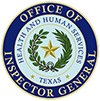Upholding patient care, preventing fraud in nursing homes
The goal of the OIG’s work in nursing facilities is to support patient care and ensure the proper expenditure of Medicaid dollars. Medicaid covers 62 percent of nursing home residents, each requiring regular nursing care that can include medical and psychological services. The OIG’s oversight is carried out each year through hundreds of inspections, audits, investigations and reviews.
Ensuring patient safety
OIG inspections focus on systemic issues and risk assessment and help detect fraud, waste and abuse. The OIG completed eight inspections in the first quarter of FY 2023 to improve the safety of residents in Texas skilled nursing facilities.
Seven published inspection reports examined whether the selected skilled nursing facilities followed specific state and federal requirements for emergency preparedness. The scope of the inspections included the facilities’ a) documentation of emergency preparedness training and testing and b) the plans they had in place.
The inspections identified noncompliance related to emergency preparedness plans and training, emergency supplies and power, and communication plans. The OIG made recommendations to the facilities with compliance issues. Key results for each inspection can be found in the HHS Oversight section of this report.
An additional inspection in the first quarter was dedicated to potential staffing issues at a selected nursing facility. Four other inspections in 2022 also examined whether the direct care licensed nursing hours recorded at selected skilled nursing facilities supported the hours reported to CMS. The inspections determined the accuracy of the hours reported at the five facilities ranged from 77 to 100 percent. The inspections also noted instances of facilities a) overreporting some hours worked due to not accounting for meal breaks and b) not having processes to consistently report correct nursing hours worked by contract staff. The OIG made recommendations to ensure accurate reporting.
OIG inspection topics for FY 2023 include nursing facility procedures to transfer patients to emergency rooms and well as facility controls to report abuse, neglect and exploitation.
Audits
Recent OIG audits assessed risks related to assisted living facilities advertising as providing memory care services without disclosing certification status for serving residents with Alzheimer’s disease. The audits also examined whether facilities conducted required background checks prior to employment, completed resident assessment and service plan documentation, and provided the required number and type of resident activities. The audits discovered opportunities and made recommendations to various facilities to improve processes related to: (a) annual employability checks of facility employees via the Employee Misconduct Registry, (b) ensuring staff-to-resident ratios comply with requirements, and (c) providing prospective residents and their guardians with written notice disclosing whether the facility is certified to provide specialized care for residents with Alzheimer’s disease and related disorders.
Nursing Facility Utilization Review
In addition to patient safety, OIG oversight of nursing facilities ensures the proper spending of taxpayer resources. The OIG’s nursing facility utilization (NFUR) team completed claim and medical record reviews at 388 nursing facilities in FY 2022.
NFUR’s nursing and coder staff review records and services for Medicaid recipients in nursing facilities, comparing billed services to those documented as delivered. Nurse reviewers use the clinical record to evaluate the quality of care, medical necessity and efficiency of health care provided to residents.
Recently, the OIG’s nurse reviewers discovered a trend involving long-term care facilities administering medically unnecessary vitamin infusions. Specific issues included:
- Administering the infusion too quickly, which could cause adverse effects on the client.
- Administering the infusion when the medical record indicated the client should not receive the infusion due to a medical condition or other medications.
- Lack of medical records indicating the medical need for the vitamin infusion.
- Incomplete medical record documentation (i.e., no detailed orders, progress notes, supporting labs or appropriate diagnosis).
- Orders for the infusions made by a physician who had not seen the client.
In the first quarter, the OIG reached settlements with two nursing and rehabilitation facilities over their billing for third party providers of vitamin and hydration injections. Both cases were highlighted in the latest quarterly report. Because of the ongoing trend, the OIG also published an issue brief to educate facilities about the billing and patient health problems surrounding vitamin infusions and the OIG's resulting investigations.

